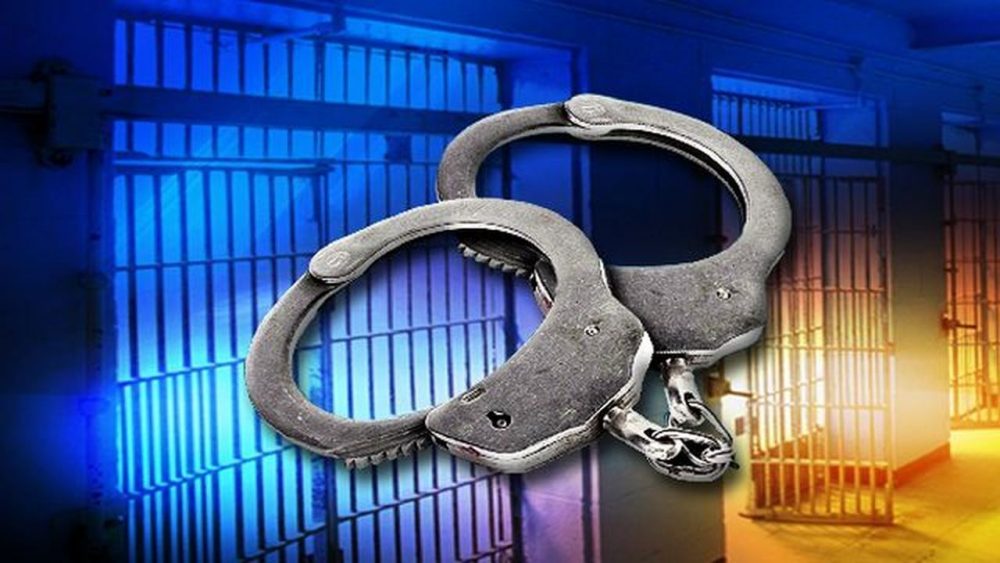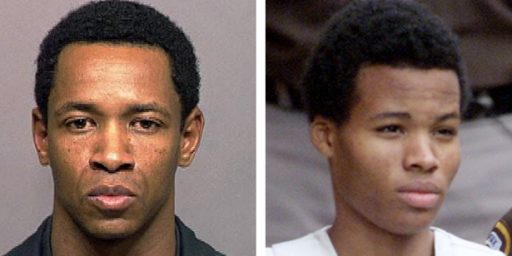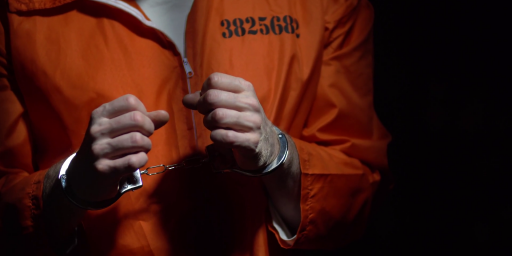Beltway Sniper Ends Suit After Virginia Changes Law
Lee Boyd Malvo may be eligible for parole in two years.

The teenager serving life in prison for his part in the DC sniper shooters has dropped a lawsuit. AP:
Lee Boyd Malvo, the Washington, D.C., area sniper, and Virginia agreed Monday to dismiss a pending Supreme Court case after the state changed criminal sentencing law for juveniles.
Under the new law, signed by Gov. Ralph Northam earlier in the day, people serving life terms for crimes they committed before they turned 18 can be considered for parole after serving at least 20 years.
Malvo was 17 when he and another man terrorized the Washington, D.C., region in 2002. He was sentenced to life in prison with no chance of parole.
The high court was weighing whether he deserves a new hearing because of recent Supreme Court rulings barring mandatory life sentences for juveniles and reserving the punishment for those “rare children whose crimes reflect irreparable corruption.”
Lawyers for Malvo and the state notified the court of their agreement in a letter Monday.The two sides agreed that Malvo’s life term would remain in effect, though he will have a chance at parole early in 2024.
Malvo also faces six life-without-parole terms in Maryland. Appeals of those cases have been on hold during the Supreme Court case.
Malvo was a 15-year-old from Jamaica who had been sent to live in Antigua when he met John Allen Muhammad and latched onto him as a father figure. Muhammad trained and indoctrinated Malvo, and in 2002 the pair embarked on a nationwide killing spree that concluded with a three-week rampage in Maryland, Virginia and the District of Columbia that left 10 people dead and three wounded.
The shooting spree captivated the region and the country in October 2002, just weeks after I moved to the area. They killed 10 innocent people and critically wounded three others in a three-week span. And they were also convicted of a rampage through Alabama, Arizona, Florida, Georgia, Louisiana, Texas, and Washington earlier in the year which killed another seven.
I’m more sympathetic now than I was then to Malvo’s circumstances. I know a lot more now than I did then about the process of radicalization. And I’m less likely to compare 17-year-old criminals to 17-year-old me.
This was a truly monstrous crime spree and it’s hard to think one could ever earn forgiveness. But, in the best case for Malvo, he will have spent two decades in prison—beginning life for the first time as a free man at 37 in penance for crimes he committed as a minor.
That’s assuming the clock is running on the Maryland sentences and he doesn’t start all over there.






I don’t approve of charging minors as adults. It’s bad science. At that age the prefrontal cortex has not yet developed fully. They are closer in reality to mentally challenged people. They have diminished capacity and that should be taken into account. Further, this kid was under the control of an older man. This was an unjust sentence to begin with, just society lashing out because they’d been made afraid.
This is a complex case. Generally speaking my views tend to align with @Michael Reynolds on the topic of charging juveniles as adults.
I think the most important thing for people to understand is also that have a chance at parole means very little. Parole is granted in only 6% of eligible petitions in VA (see link below) and can essentially be denied for any reason.
So while Malvo may be eligible, its highly unlikely he will ever be granted it.
https://patch.com/virginia/richmond/virginia-denies-vast-majority-parole-requests-data-shows
@Michael Reynolds: In psychiatry, someone under 18 can’t be diagnosed with psychopathy or sociopathy, since antisocial behaviors are fairly common among minors who grow out of it when they reach adulthood.
I like the way you said this:
I teach martial arts to kids. Usually they are younger than 17, but we get a few that age. They are pretty easy to influence and we have to take care not to have too much influence on them. 17 year old me wanted to think he couldn’t be influenced, but now all I see were some pretty great influences (for good!) on 17-year-old me.
@Jay L Gischer:
Completly OT, which martial arts?
(aside: I actively study/teach Chinese and Filipino Martial Arts, though right now my focus is learning not to suck at BJJ).
@Kylopod:
I’ve said before that I was psychopath-adjacent til my mid 20’s. I was never violent, thankfully, but the right and wrong of things wasn’t something I pushed aside, it was simply not there. A part (only a part) of my motivation for jumping bail is that I could see what dark dead-ends prison would lead me to. Fortunately love and all that happened.
This may be the one legitimate use for religion, using threats of eternal torment to get people – men – to not be complete assholes before their brain is rounded out.
As a very young person growing up in the Deep South, I heard statements like “you do an adult crime, you get adult time.”
This is probably page 867 of my autobiography, “How I Knew I was Surrounded by Complete Idiots by the Age of 10”.
While that was a great thing to realize, it actually fucked me up for decades, because I just stopped trusting anything an adult ever said, and started making my own rash decisions, and it didn’t work out.
I was quasi-feral at 17.
Was socialized mostly by peers and books and tv.
There was a bed and food, but the rest was up to me. Mutual decision not to impinge on their lives, and they not on mine. Which sort of worked – less stress all the way around.
Greatly reduced expectations as to familial bonds was normal.
It was really unhealthy, although I did not know that then.
I did develop a relationship with my mother much later. This will sound harsh: she was not a terribly interesting person. It was not a rewarding relationship.
@de stijl: when you start to understand your parents as people, sometimes it’s good, sometimes it’s…not good.
On the plus side, I knew very early who I did not want to be.
Knowing who to be is an entirely different question.
Am still working on that one.
Also, why is Rimmer from Red Dwarf in this Lara Croft movie that is on in the background, wasting time until Saul o’clock?
Speaking of which, why is Cat on Death In Paradise? (It took my forever to figure that one out! One day, boom!, That’s Cat, you moron. It had bugged me for years.)
@Teve:
The thing is, this isn’t unique to the “Deep South.” This is said pretty much everywhere in this great land of ours.
I’m not questioning your experience, but we — especially those of us in the “modern North” — tend to use “deep South” to indicate all that is backwards. But given my work in criminal justice space, I can tell you that this isn’t a “deep South” attitude — it’s an *American* attitude.
@mattbernius:
My views also align with Michael Reynolds’ on this, but the future of childhood murderers is pretty much at the absolute bottom of my list of priorities. I agree, but I oppose spending any time on it that could be used on anything that impacts more people.
Make prison reformative, and help a shitload of people. Reform sentencing across the board, and help a shitload of people. Prosecute white-collar criminals according to the damage they do (stealing money from pensions, for instance, cuts lifespans… add that up, decide how many lifetimes that is, and prosecute for murder), and help a lot of people.
I’m struggling to think of a position that I agree with that I would be more willing to sacrifice.
I’m willing to live with the injustice of childhood murderers being punished to harshly. Human misery is fungible — we can help more people elsewhere with less effort.
@Gustopher:
I don’t see it as an issue of helping others, it’s about defining ourselves, living up to our own standards. Who are we, not, who are they.
@Michael Reynolds: Yeah, it’s about the principle, not this particular case. I should note in all this that I’m extremely skeptical that Malvo has truly reformed. At the time he sounded like a true monster (who laughed when describing his own crimes). Imagine King Joffrey making it to 35. Would you buy his claims to be a changed man?
Personal note: I lived in Baltimore at the time of the shootings, and it was later reported that John Muhammad stole the map he used for the killings from the Reisterstown branch of Enoch Pratt library–a branch I happened to visit frequently. I might have literally brushed shoulders with this guy without ever knowing it.
The case was also a stunning example of the power of suggestion and unreliability of eyewitness testimony. Witnesses kept reporting to have spotted a white van at the scene of the crime. I drove to school a the time, and I was on constant lookout for any white vans I saw. Of course I quickly discovered there were white vans everywhere (you know how the moment you notice something it seems to suddenly become ubiquitous?), so that didn’t help me. When the two were finally caught, it turned out there was no white van–they’d committed their crimes in a blue Chevy Caprice sedan.
To release Malvo is to assume that the influence is over, that the delight in planned murder of innocents has disappeared from his brain. Further, it is to assume that he will emerge from prison and all the influences there into a supportive situation that will allow him to integrate peacefully into society. Can anyone here, if there were on that parole board, honestly say they would take that risk? Personally I recognize that I might be committing an injustice against a truly reformed man, while simultaneously confident that we have no mechanism to truly judge the risk, and so I would vote against parole every time.
@Kylopod:
This, btw, gets to the challenge of doing anything in the criminal justice space around data and analysis.
Its drilled into everyone’s head during training — whether it Law Enforcement or Lawyers — that every case is unique. And that leads to a mindset that is deeply resistant to generalizations or drawing meta conclusions from data. So you end up with people denying things like systemic racism, despite clear trends in the data (even when you control for proportionality) because of a belief that the facts of a given case led to an outcome versus structural issues.
@mattbernius:
It’s never motive, singular, it’s always motives plural. Same with causes. But people want simple answers scrubbed of all ambiguity or shades of gray. And they’d very much prefer if that singular cause validated their prejudices.